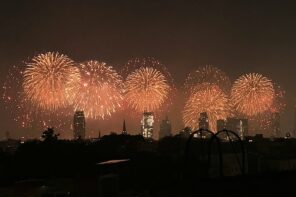Thanksgivukkah promises to be epic. We will not see another one for over 78,000 years, which, even by Jewish standards of memory, is an awfully long time. This mash-up holiday to end all mash-up holidays is going to be a high point of many a Jews’ year, with recipes for latkes with cranberry apple relish and brussel sprouts with pastrami (instead of bacon) going viral, and the Menurkey likely to grace many a holiday table.
But why? Aside from the marketing genius of Thanksgivvukah proponents and the general wonders of gastronomic Judaism and the New Jewish Food Movement, what drives the excitement and creative expressions?
I would posit, as many have, that Thanksgivukkah does what its older cousin Christmukkah can’t quite do: it fully grafts Jewish Americans into a story of America freedom, civic piety, and Norman Rockwell-ian family celebrations. Long ago, it seems, South Park featured the young Jewish character Kyle Broslowski singing “It’s hard to be a Jew on Christmas.” Though he ultimate reconciles himself to his Jewishness, he also bemoans his social position. “I can’t sing christmas songs or decorate a christmas tree, or leave water out for rudolph ’cause there’s something wrong with me! My people don’t believe in Jesus Christ’s Divinity!” Theological difference prevents participation in American civic-religious ritual.
There is no Christ in Thanksgivukkah. Although this hybrid hullabaloo has its critics, it does not break any historical taboos. There may be “no such thing as a Hanukkah bush” (although many contemporary blended families would beg to differ), but we now have an American Gothikkah Thanksgivukkah poster, a #thanksgivukkah hashtag, and T-shirts.
Thanksgivukkah is a way of being out, loud, and proud. We’re here! We’re Jewish! We eat turkey AND latkes! Get used to it! As Jonathan Sarna observed in his recent article on the Pew Survey, there are significant “silver linings” in its findings—if we even want to engage with the eternal “But is it good for the Jews?” question. Most notably, it evinces Jewish pride. We don’t need to get nose jobs anymore. We’re not running from the Red Scare. In fact, the mayor of a major American city—Boston’s Mayor Thomas Menino—issued a proclamation in honor of Thanksgivukkah. I have deeply ambivalent, uncomfortable feelings about state displays of religion, but you have to feel a bit of awe: the city that won the World Series this year (fear the beard!) is also acknowledging our minor festival.
Combining traditions is not a new thing in any religious tradition or culture; Christmas trees and Easter bunnies are, after all, remnants of pre-Christian European customs. The emergence of Hanukkah as a “major” Jewish holiday in America was the result, in part, of the desire to keep up with the neighbors. As the 1947 United Synagogues guide How to Celebrate Hanukkah at Home put it, “Be mindful of the fact that your non-Jewish neighbor takes time and pains to make Christmas an occasion of gladness. Unless you take equal pains with the Hanukkah party, you cannot hope to make the Festival a thrilling experience.” That anxiety remains today, no matter how many lovely Thanksgivukkah tables we set. How can we ever compete with the juggernaut of Christmas?
Despite the fact that I am with my mishpacha (family) in that vaunted Jewish mecca of the New York metro area this week, I am still a lonely Jew on Thanksgivukkah. One USA Today headline phrased it perfectly: “Thanksgivukkah stirs thanks, angst.” As a scholar of religions, I see Thanksgivukkah as a phenomenon to unpack, not to judge. As a Jewish American, I am seduced by the joys and kitsch of this once-in-a-life time event … but it’s still not the Christmas tree I longed for as a child.
Perhaps this is just another classic move of Jewish alienation, diaspora, displacement. Our wacky calendrical coincidence is both a miracle and a mismatch. Consider the secular/sacred-ish ritual shopping season. This year, Black Friday will fall on the second day of Hanukkah, after three crazy nights are done and gone. When the glow of the Thanksgivukkah candles has faded, Christmas carols will still be playing in every public space and lights will still bedeck our neighbors’ homes. We have queered Thanksgiving with our Festival, creating something new, subversive, beyond old identities, and it will indeed be a thrilling experience. But come December 25th, we will still be eating Chinese food and going to the movies.




